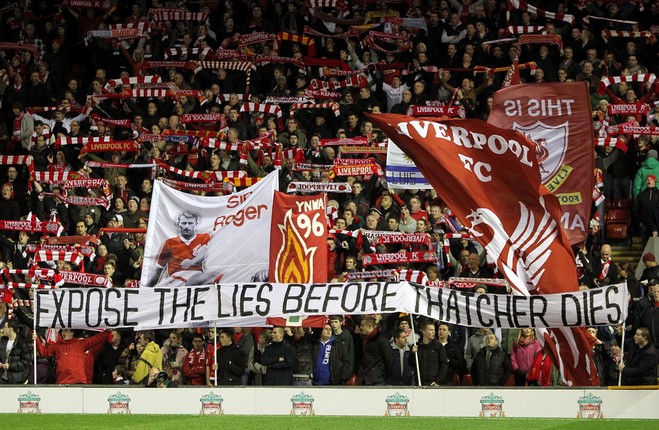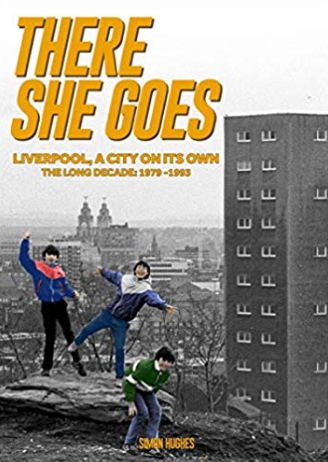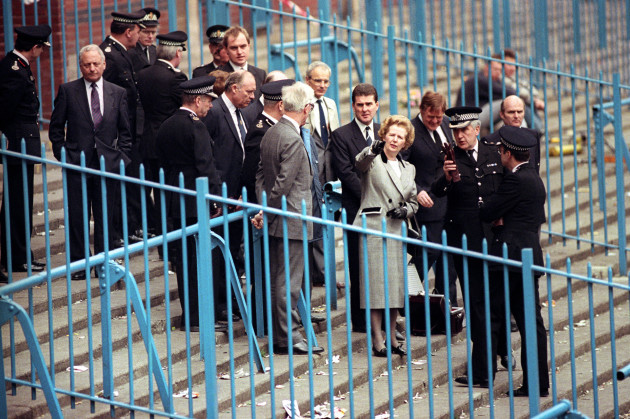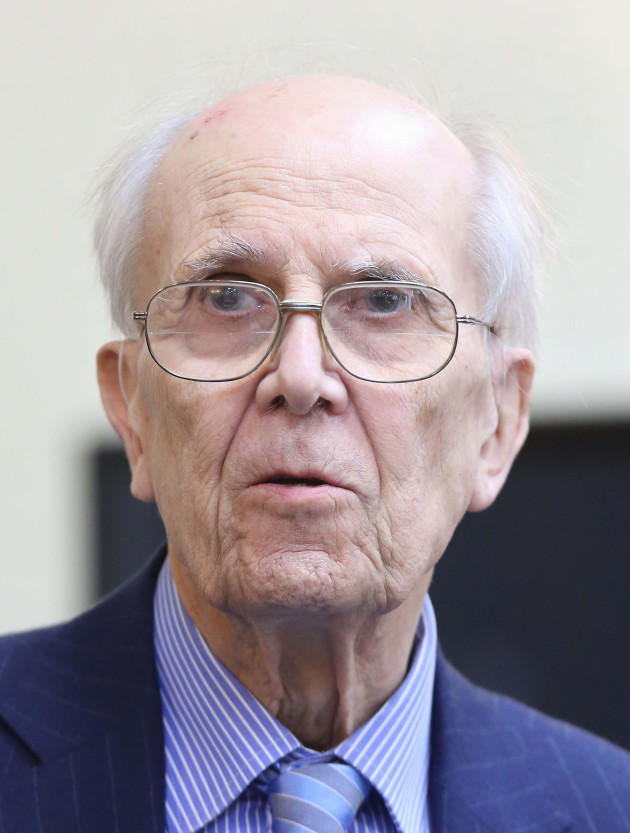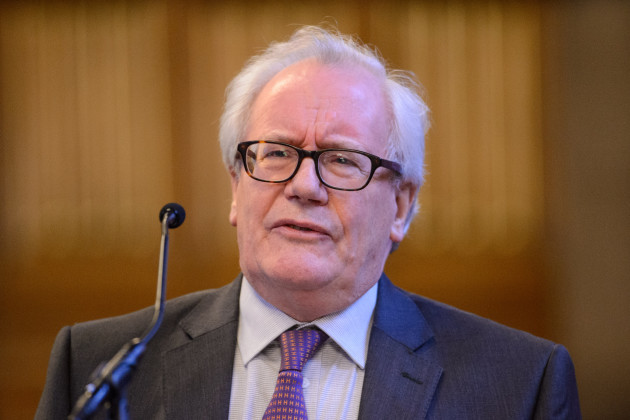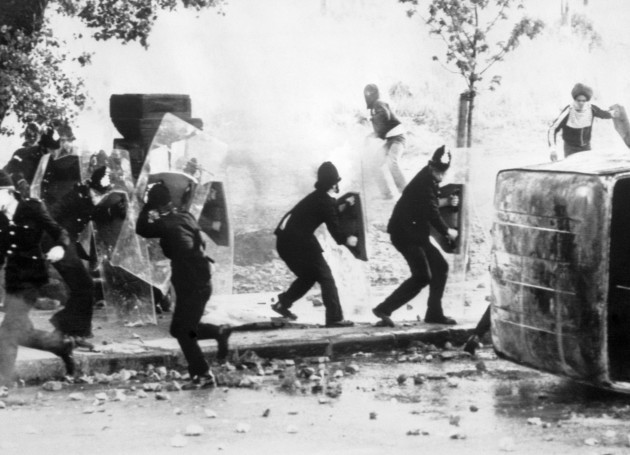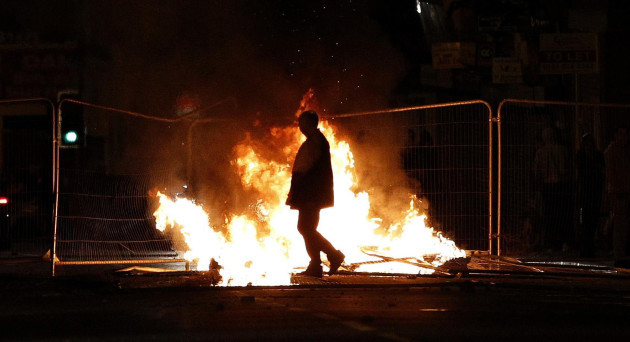Updated at 11.19
MANY LIVERPUDLIANS see themselves as the outsiders and outcasts of Britain.
The phrase ‘Scouse not English’ emanates from this disillusioned feeling.
It partially explains why ‘God Save the Queen’ was booed by Liverpool FC’s fans before the Community Shield Game against Man City at Wembley earlier this year.
Part of this mentality can be explained by the city’s background. A large population with Irish roots exists there, while its past status as one of the great ports of the British empire ensured that immigration from several other countries was also significant.
This ill-feeling was compounded by what Simon Hughes describes as the long decade: 1979-1993. Margaret Thatcher was prime minister of Britain for much of this period and it was her government’s policies that proved so harmful to Liverpool in particular.
In 2011, it emerged after the release of confidential documents that following the July 1981 Toxteth Riots, Thatcher was urged to abandon Liverpool to “managed decline” by her chancellor Jeffrey Howe.
Hughes’ new book consequently documents this grim period for the city and how it managed to fight back against such antipathy from politicians, the mainstream media and ignorant, uninformed people from outside of Liverpool in general.
The book explores the various challenges the city faced during this era, with detailed looks at the heroin epidemic, the music scene, the tragedies at Hillsborough and Heysel and the infamous murder of James Bulger. It assesses the impact these events had on Liverpool and its perception in the wider culture, with the effects of Thatcher’s policies and their consequences still to some degree felt today.
The42 recently sat down with Hughes to discuss some of the themes explored in his book…
What made you want to write this book?
I don’t think anyone had written the book for a start. There are a lot of moments which it covers, which are being written about in isolation and people have dipped in and out of, issues which may have contributed to that situation, social issues and their consequences, but the book hasn’t been written, the decade hasn’t been written about before in one place really in a journalistic way. There have been more academic studies of the 1980s in Liverpool. But I just felt nobody had written about it in that way before.
Some of the Liverpool books that I’ve done [before now] maybe haven’t stimulated me in a creative sense in the way this one has. The reason is, over the last 10 years, in Liverpool there’s been this acceleration of our identity among young people — politically, socially, how they feel about the city, its place in the country it in, the Scouse-not-English mantra really ramps up. I suppose the outcome of that to some extent was the booing of the national anthem at Wembley at the Community Shield. I grew up as part of that generation. The 1980s, I’ve always felt, there’s almost this sort of ownership of the period from the people who lived through it, while the voices of the people who lived through the consequences have been lost a little bit.
I would include myself in that, because I grew up with this hatred of Margaret Thatcher, because my dad worked in the energy sector. His job was always under threat for as long as I can remember, because obviously the energy sector is privatised, continuous takeovers and that meant the threat of job losses.
So I grew up with this acute sense of: ‘Why has this happened and why have we allowed it to get to this situation?’ I just felt in Liverpool, people have an idea of what they feel about Liverpool as a place, but maybe it needed to be explained from a person of a similar age category as them — why this is the way it is.
I was talking to a friend of mine a few years ago. He’s a smart lad, understands what’s going on. I would trust him on pretty much anything. He just said in the middle of this debate, almost apologetically: ‘Why do we all hate Thatcher? I don’t really know why.’ I was bewildered by that a little bit. It was very much a tribalistic way of looking at things. But I thought this does need to be explained. The book could have been called ‘Thatcher’s Liverpool’ really. I just hope it connects a lot of the dots, particularly for the younger generation.
I know the older ones might read it and say: ‘Well, it’s not quite like that.’ I could have written 400,000 words on this book and it still wouldn’t have felt complete. Everybody has a slightly different way of looking at it, their memories are slightly different, though they may be linked in some ways.
It’s an amazing period of time, which totally transforms the identity of the city. I just felt it needed explaining to a level of depth that people could understand. Once people have read it, not just people inside the city but outside it, they will have more of a cultural understanding of why people feel the way they do about a lot of the things that happened and where the city sits.
Did it feel like a departure given that you had not written any specifically non-football books before, even though a lot of them had verged into politics etc and this book still features football to a degree?
Over the last four or five years, The Independent were quite good with me, because they were like: ‘We don’t want you reporting on the injury updates, following the transfers.’ If you’ve got news to break, break it, but don’t be following what everyone else is writing. Try to bring a different voice to the paper. So that allowed me to write about a lot of the issues affecting Liverpool and the north-west. So it was something that developed in my mind and something I wanted to write more about.
I didn’t find it a challenge in terms of writing it at all. I was just conscious that the issues I was writing about were a lot deeper and more complex. People will have different recollections of certain events, so I think it’s almost impossible to say it’s a complete version of events — people can look at the same thing and have a totally different view, even in Liverpool.
Even this idea that Liverpool was a Militant [a Trotskyist group who took control of Liverpool City Council and had a major influence on the city’s politics during the 1980s] city. Yes it was. Militant was on the Labour Council. But that didn’t mean everybody in Liverpool was Militant. There were anti-Militant protests and quite a lot of strong feeling against Militant. So I was conscious of all that.
The book starts off with the Tories getting in in 1979. I was thinking: ‘I’ve got to get some Tory voices in there.’ A lot of books from this period come very much from the Liverpool perspective. I just thought you’re not getting the full story unless you try to reflect what the city is up against.
I was conscious of the fact that some people might think: ‘Why are you going and speaking to Norman Tebbit?’ And even Michael Heseltine, to some extent. If you don’t have that opening chapter, I don’t think the book works. So they were the immediate challenges
When you spoke to them, did you in anyway find yourself sympathising with those Tory voices and their perspective?
No. It was a strange process, because I looked at the first Thatcher cabinet and I think Nigel Lawson was the only one that was still alive more or less. I sent an email to him, didn’t get anything back. The second cabinet, Tebbit was in it, and I just thought, notorious. You’ve got to really explain what their ideology was, what monetarism was – it’s an economic concept, which is quite boring and dry, but you’ve got to write about it in a way that people are going to understand. That was part of the problem. I don’t think people really realised what this meant — it meant if you were struggling, you were doomed essentially, within the framework of the Conservative government. Liverpool was one of the doomed cities.
I quite enjoyed it to be honest. There’s a lot of people I’ve interviewed in the past that I don’t necessarily like or agree with. It gives you a chance to have a wrestle with them. You’re certainly not trying to convince them of your viewpoint, because what’s the point in that?
You get from them an impression of how they saw things. And in many cases, take Norman Tebbit, it just reinforced what a lot of people already thought, of what their plans are and some more. When I went in to see him, he’s quite a frail-looking man. He’s old now. There’s a temptation to have some sympathy with elements of his life. For example, his wife is upstairs [in his house], she’s got dementia and has been disabled since the Brighton bombing. So no matter how that’s happened, I would have sympathy for anyone in that situation really, because it’s horrible, isn’t it?
But then you start speaking to him about politics and quite clearly, they’re diametrically opposed to everything that I believe in. It was still right wing, more right wing probably than people realise. He’s not a particularly nice man really.
So you’ve got to separate all that. It’s not about me, it’s about getting as much detail out of them as you possibly can. Saying things that’s going to provoke them that gives you answers and insight, stuff that you normally wouldn’t get. So you can challenge them, but if you’re hostile, you’re potentially going to lose something. A lot of interviewers in Britain are probably finding the same thing with the way the political landscape is. In some ways it’s never changed.
But I quite enjoyed doing that really. It was a strange experience for me going in to talk to people like Patrick Minford. People in the wider consciousness might not know who he is, but he was even more right wing than Tebbit. He didn’t think Thatcher went far enough in some cases, and I totally disagreed with everything more or less that he said. But if you disrupt the flow of what he’s saying, you might lose something.
Hopefully people will read it with the context that’s needed, because you see what happens to Liverpool after all these plans. You realise a lot of the visions that they had were particularly unfair, unrealistic and have failed.
You reference in the book Liverpool people thinking of themselves as outsiders compared with the rest of Britain. Is much of that to do with the Irish connection?
I think so. Everything in Liverpool is explained by the existence of the docks there. It brought immigration, it brought trade, when it was no longer relevant, the trade went. It was boom or bust. If you look at working-class history in Liverpool, the working class has suffered because of sectarianism really. It was difficult to get a united workforce because of religious divide, essentially. So it suited the power brokers in Liverpool for that to exist the way it did.
I’m from an Irish background. My granddad’s family are from Dundalk. My wife — one of her grandfathers is from Longford. I think we were always brought up to question. In other areas of Britain, I think it’s a very British trait — not to question authority. But that wasn’t the case in my upbringing, you’d always question what’s going on. And it wasn’t necessarily taught. It was socially ingrained into you — if you’re not happy about something or not understanding something, question why that is. I think that conspiratorial culture is across Liverpool.
Michael Heseltine has a very different view of Liverpool’s history, because Liverpool’s history has been written by the wealthy in many cases. So this idea that Liverpool was a great British trading point — one of the great ports of the empire. It made a lot of money for a very small number of people at the expense of great poverty in the city. That element of the city’s history has not been explored with the same enthusiasm as the more lucrative element of what happened in the city.
I think it’s totally shaped by Ireland and there’s a massive sense of Irishness throughout the city. In the 1920s, there was still an Irish nationalist MP in Liverpool. They were the only city in the country, I think, to have that, which aligned it as being different anyway. So 100% it looks out to sea rather than inland for answers really.
There was discrimination not just against the Irish, but against black people as well in Liverpool. It was a serious problem in the 1980s, and still is now, but it was probably more overt then, right?
Liverpool has changed a lot as a city. Since the middle of the [20th] century, it’s changed a lot. Liverpool’s solution to its economic woes is to reinvent itself as a tourist destination really. Certainly, in the city centre, it’s a much more vibrant, multi-cultural place. Nevertheless, it’s still remarkable. Racial segregation still exists in Liverpool to some extent. The black Liverpudlians are still in Toxteth really. Although the communities in Toxteth have changed because of subsequent immigration. There’s a big East African community in greater Toxteth now.
But in the 1980s, there should be no surprise really. People talk about the Toxteth Riots or the Liverpool 8 Uprising as race riots. That’s the way it was framed. But the reality is — they were unemployment riots. For decades, racism existed in Toxteth. You’ve got to question why at the point where unemployment was at its highest nationally, and I think Toxteth was the second worst area for unemployment in Liverpool, why suddenly does that [relatively peaceful environment] change? People had had enough. They were unemployment riots as well as race riots. But of course it suited the government at the time to say ‘it’s race riots, it’s their issue,’ which was inaccurate.
One of the other issues is because of the police force — a very aggressive, unforgiving and not very understanding police force, which swept through the district like an invading force. So all these issues contributed towards that. But the tipping point has to be unemployment. Is there any surprise that the city or district that suffered the most, that people have had enough? It will repeat itself again, I’m sure.
People point towards 2011 when the youth riots spread across the country. I understand things got out of hand, but at the very root of that were the first years of austerity. A lot of people struggled with the big changes. We’re seeing the outcome of those measures years later, but those were the early years of austerity. Profound changes in the way society was being organised. So that was the root force of it. But people prefer to look at the outcomes rather than the causes, don’t they? The reasons why this happens, rather than actually spending time thinking about how can we stop it from happening again.
In that era, Liverpool 8 still feels the closest area to Liverpool city centre, but you still could be in a different city to some extent. It still feels like a border almost, which is sad, it shouldn’t be that way. People in Liverpool 8 should feel like they have opportunities for work.
If you come from a different city, I don’t know if you’d have a different experience, people from an ethnic background, coming to Liverpool. You might see it slightly differently. I think if you’ve grown up in Liverpool and lived with the environment, it hasn’t changed a lot. I speak to [the first black player to sign professionally for Liverpool] Howard Gayle a lot, and I think he would back that up.
On a slightly different but related note, the title of the book ‘There She Goes’ is obviously a reference to the famous song by The La’s. What made you go with that and did you see the band as a product of their time?
It’s funny, there are several reasons. It’s connected to the content in the book. The music scene is explored. The heroin epidemic is explored — the thing that happened in Liverpool, which hasn’t really been written about a great deal, it’s been largely ignored by the local and national media. And obviously, heroin influenced the title of that song by The La’s. That song feels like the backend of Liverpool in the late ‘80s, early ‘90s. And also, the way people speak about Liverpool, it’s like ‘there goes Liverpool again,’ there’s always that attitude, or you could apply it to Thatcher I guess — ‘There She Goes’.
I went to interview [The La's bassist] John Power and it was a bit of a regret not to get [their lead singer] Lee Mavers, although I don’t know how open he would have been about the way things were.
Did you try to arrange an interview with Lee?
I did. He lives a reclusive life. A friend of mine, he’s a musician, he said: ‘You’ll only get him if you go and interview him about Everton,’ which is a bit mad.
But I think The La’s were [a product of their time]. I’m quote glad I got John Power instead of Lee, because John was quite a bit younger than Lee. He was trying to go into employment after the worst of unemployment, and going into the cultural and social landscape that had been created by early Thatcher. So it was interesting to get his impressions of that challenge.
He’s a very bright fella. Without sounding too knobby about it, there are a lot of thoughtful, perceptive people in Liverpool who understand what’s going on. He wasn’t alone in that generation, but with a lack of opportunities, what do you do? You end up passing the time away by smoking lots of weed, getting into a band and creating lots of music. A lot of people do try to do that. I still think the best music is often produced in the worst times for a lot of different reasons.
It was funny how I came up with the title. I’m really shit with titles. It does my head in. Liverpool played Sevilla in the final of the 2016 Europa League. At half-time, they were 1-0 up. Jurgen Klopp had just arrived. It was brilliant. And at half-time, ‘There She Goes’ is played on the PA system. The whole of the Liverpool end went properly nuts, belting it out. I just remember thinking: ‘They’ve got to win now.’
It became a little bit of a comfort in the days afterwards. They obviously got humbled in the end. But I remember saying to my wife: ‘The best moment was when they played ‘There She Goes’ on the PA and everyone was singing it.’ A few people were like ‘Lee Mavers wrote the song,’ and I was like: ‘John Power is sort of behind it as well.’ My wife was just like: ‘Why don’t you just call the book: There She Goes.’ I thought: ‘That’s not a bad idea.’
And speaking of football, how important was that for Liverpool, especially in that difficult period in the ‘80s?
I think it was an escape for everybody, both Liverpool fans and Evertonians. It still is the escape for a lot of people. Obviously, Everton aren’t doing so well. But if your football team’s doing alright, you kind of forget a lot of the things that are going on in your life for a short period of time to some extent.
But it was the way that Liverpool showed the best of itself during that period. Everybody else had jobs, a house, better living, social and working conditions, but Liverpool still had the best football teams.
I think that bred a huge amount of resentment. Liverpool and Everton were so dominant during that period. Everton were an absolutely brilliant football team, quite similar to Liverpool. Two aggressive teams, two centre forwards, two wingers. I know a lot of teams played 4-4-2 then, but there was very little difference between the sides in certainly the middle and latter part of that decade. Without football, you wonder where Liverpool would have been and where they would have had their moments of enjoyment.
Football still is the most important thing in Liverpool, I think, really. I genuinely do wish both teams were at the top of the league. Most people know I’m a Liverpool fan, but I would like to see Everton being really competitive and the two of them having a proper bash at it, because the rivalry’s changed a lot over the last 30 years unnecessarily. I think if you had two successful teams, I’d love to see what the city would be like. My mates are all Liverpool and Everton fans and I would like to see them all enjoy watching football and get the same level of excitement I get.
Obviously the book entails Heysel, which is an important chapter. There are a lot of myths that have grown about Heysel — some understandably and some unreasonably. I think that was a turning point where the rest of the country did turn against Liverpool in that period — ’85, where you’ve got Militant campaigning.
Militant was a natural reaction to what was going on. Why would you not listen to Militant when they’re offering solutions to problems where the city is losing its population? Why would you not want them to get in? It’s a perfectly human, natural reaction to want that change and at least fight for something.
You look at the cities in America, or in Britain like Sunderland, it’s had the heart and soul ripped out of it. Liverpool has obviously still got the music scene, football and a few other things. But I wonder where the city would be if it wasn’t for [what happened] — people will dismiss what Militant and the Labour City Council attempted and in some cases were successful at the time. But it had to happen. It couldn’t go on like that in Liverpool.
At that time, Thatcher calls Liverpool a particularly violent part of the country. At that point, Liverpool becomes a collective for the first time really. The leader of the country is saying ‘you are this,’ which was just not true.
I remember growing up and seeing Liverpool the late ‘80s, early ‘90s presented in the media. Although I lived in a relatively comfortable part of the city, I didn’t think what I was seeing was true. It wasn’t the way people lived at all, and it was the way it was being projected. That’s just another reason why I wanted to write the book — it’s just got out of control, the way people speak about the city. It really angers me, to be honest.
I think young people in the city have had enough of being stigmatised and being told that they’re this and that. If you rail against it, it’s: ‘Oh, where’s your famous Scouse humour?’ It’s like: ‘It’s because it’s not funny mate, and you’re actually saying stuff that’s just not true.’ I grew up with that going through university and living in Sheffield every day. A day wouldn’t pass without somebody making a comment about Liverpool.
And don’t get me wrong, some things might be true. But I think I mentioned in the intro [of the book] that Liverpool or Scousers sort of filled a gap in the jokes in that period. Because you get a lot of left-wing comedians in that period who are moving racist jokes out and quite rightly making them unacceptable. But what fills that gap? It’s not racist having a go at Scousers, so it was a suppressant, and it still exists to this day.
Finally, the question you mentioned at the start: Why do Liverpool people hate Thatcher? What conclusions did you come to?
In the book, I haven’t put a conclusion. It finishes with James Bulger which, again people ask me: ‘Why is it ’79-93?’ I think, in people’s heads, they see decades and think ‘that decade is over, that period of time is going’. That’s just not the way it works.
James Bulger is a very sensitive subject to talk about, particularly in the city at the time. If you look at the way it was reported, very few people reported on that dreadful event in a sympathetic way towards Liverpool.
Liverpool by that point had 14 years of Thatcherism. Walton, which is the most safe Labour seat in the country, the home of Militant, had very little investment. There was poverty and desperate problems there. But people carried on — it didn’t make people bad people. Does the possibility of something as terrible as that increase in a place that has been subjected to all this [trauma] in that period of time? Nobody was asking that question.
In a lot of the media, Liverpool felt like it was on trial again. It was in the dock. Hillsborough’s still fresh in the mind of a lot of people. [The former editor of The Sun] Kelvin MacKenzie saw it as an opportunity to try to ingratiate himself back with the Liverpool public, which he was wrong about.
My conclusion is that ’93 does feel like a turning point. The murder of James Bulger, which you’re not trying to rationalise or justify at all, trying to explain why it may have happened is not trying to do that. It’s trying to explain how can it come to this.
I’m not a religious person. A lot of people in Liverpool took the ‘evil’ stance. It takes Liverpool out of the equation, because evil is evil, it’s not something that spreads, it’s innate and uncontrollable almost. So Liverpool took that stance, quite understandably, because of everything else it had been accused of at that point. And of course, it’s got quite a big Catholic population. And when you see other people acting the way they did towards the two boys who committed the murder, it was almost their way of saying ‘that’s not us, that’s not the way it is’. But people looked at it as an extension of the way they are in a lot of cases.
A fortnight or so after Hillsborough, Liverpool get their first chance of funding from the EU, which allows itself to start the process of rebuilding. But I think the key question is, the Jeffrey Howe memo and the ‘managed decline’ of Liverpool, look at what happened in Liverpool. The conclusion must have been that that was their policy — just doing nothing, which is pretty much what they did.
Militant did manage to get some concessions out of them, which was an amazing political heist if you ask me, but that’s another issue.
I think you just need to look at what’s going on in society now, it’s a consequence of what happened in the ’80s. The mass selling off, privatisation has failed in a very short space of time. Maybe the telecommunications industry has got better, but all the other industries have failed. And this has failed a lot of people and they feel let down by successive British governments, which haven’t done enough to push back against a lot of the measures that Thatcher put in place. That doesn’t make Brexit right in my opinion. You’re attacking the wrong point.
I just think the British government have failed the people in a lot of cases, but people keep falling for these demagogues, like Thatcher or Boris Johnson, with simplistic solutions to complex situations. How much further can it go again, I wonder?
Liverpool has managed to rediscover itself through the vision of the people. The history of the city makes it a fascinating place to go to and has allowed it to rediscover itself through tourism.
But where does it go from here? There are still a lot of problems if you go outside the city centre, there are still massive social issues. Homelessness is the scourge of every British city, but particularly in Liverpool, it’s at a desperate state. I was discussing before about unemployment in Liverpool — I think it’s at 5% at the moment, which is not ideal, but it’s not at 40%, as it was in some areas of the city in 1981.
But I think poverty is showing itself in a very hyper-capitalist way now, which we saw in America 30 years ago under the Ronald Reagan government. That’s where we’re at now and it does concern me with the poorest people. There’s a lot of working people in Liverpool who have to use food banks. The cost of living has gone beyond what their incomes are. There are a lot of things to solve and it’s not just solvable by Liverpool City Council. There’s got to be a greater change nationally.
So my conclusion is this — in the last 50 years, there have only been three years when Liverpool’s council has aligned with the governments nationally. That was between 1970 and 1972, when the Liverpool City Council was still conservative. Edward Heath was the prime minister then. And then, for one year, between 1997 and 1998, when New Labour came in. Liverpool rejected that within one year and went back to Lib Dem. So Liverpool has always been a city in opposition.
If I was to say one thing about people in Liverpool, there’s a desire for fairness and if things seem unfair, we’re the first ones to shout about it. Just saying that, people will say; ‘Here we go again, people from Liverpool trying to make out that they’re more pious or just than other people.’ But I do genuinely think that. If something’s not right, we call it out quicker than anybody else.
New Labour succeeded in some things, but failed in a lot of things and we were the first ones to reject it. People forget that, people forget 12 years of a Lib Dem-led Council in Liverpool.
I think in the last 10 years, things have changed again. 2009, you’ve got the 20th anniversary of Hillsborough — I can’t write or say too much about it because of what’s been going on in court — that opens up the conversation again.
Within two or three years, you’ve got the Hillsborough Independent Panel, that gets people talking about it. In the same period of time, you’ve got the Jeffrey Howe memo released. People are furious, even though they feel vindicated with the way they feel, younger people are talking again while you’ve also got austerity and the impact that’s having on families.
So younger people are becoming a lot more politicised in Liverpool than maybe my generation was. People in their 20s — I’m 36 — have become more politicised by what’s happened in the last 10 years. So that’s where we’re at now with Liverpool.
This conversation has been lightly edited for publication.
There She Goes: Liverpool, A City on its Own: The Long Decade: 1979-1993 by Simon Hughes is published by deCoubertin Books. More info here.
The42 is on Instagram! Tap the button below on your phone to follow us!
